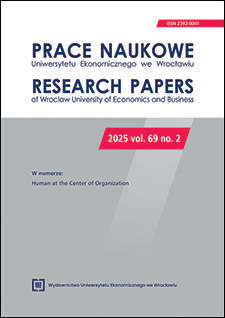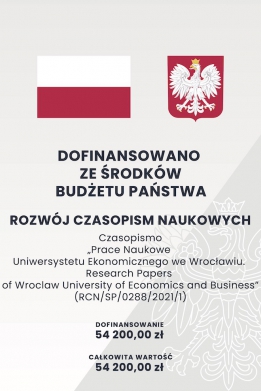Tutoring as an Experience that Strengthens the Senseof Coherence of Academics
DOI:
https://doi.org/10.15611/pn.2025.2.02Keywords:
salutogenesis, professional stress, academics, tutoring, sense of coherence (SOC)Abstract
Aim: The instability of the modern world and the challenges associated with the increasing demands on academics have become for them a burden with high stress potential. Thus, this paper seeks to understand whether a tutoring process can strengthen academics’ sense of coherence.
Methodology: The authors used a desk-based content analysis of the tutoring process documentation and an open-ended survey of a group of tutors at a selected public university in Poland.
Results: The results of the study indicate that the academic tutoring process carried out in one of the public universities can strengthen the sense of coherence of academics, and can be influenced by three aspects: comprehensibility, resourcefulness and meaningfulness.
Implications and recommendations: Among the key factors influencing the construction of the sense of coherence of academic teachers in the selected university were the support of the university, the support of the community of tutors and also the support of the coordinator of the process.
Originality/value: Despite numerous publications on the stressful working environment of academic teachers, no reference could be found to the process of academic tutoring as a tool for enhancing academic teachers’ sense of coherence.Downloads
References
Antonovsky, A. (2005). Unraveling the Mystery of Health. How to Cope with Stress and not Get Sick? IPiN.
Augustus, J., Goodall, D., & Williams, B. (2023). Does the Role of Personal Academic Tutor Have an Impact on Staff Wellbeing? Research in Post-Compulsory Education, 28(4), 693-719.
Bone, E. K., & Ross, P. M. (2021). Rational Curriculum Processes: Revising Learning Outcomes is Essential Yet Insufficient for a Twenty First Century Science Curriculum. Studies in Higher Education, 46(2), 395-406.
Chan, H., Mazzucchelli, T. G., & Rees, C. S. (2020). The Battle-Hardened Academic: An Exploration of the Resilience of University Academics in the Face of Ongoing Criticism and Rejection of Their Research. Higher Education Research and Development, 40, 1-15.
Czekierda, P. (2015). What Is Tutoring? In P. Czekierda, B. Fingas, & M. Szala (Eds.), Tutoring. Theory, Practice, Case Studies (pp. 21-42). Wolters Kluwer.
Czekierda, P. (2019). What Can We Gain from a Social Perspective by Introducing Tutoring to School? In P. Czekierda, M. Budzyńska, J. Traczyński, Z. Zalewski, & A. Zembrzuska (Eds.), Tutoring at School. Between the Theory and Practice of Education Change (pp. 15-18). Society for Open Education.
Czyzewska, M., Duda, E., Lejzerowicz, M., Perkowska-Klejman, A., Sarnat-Ciastko, A., & Zawadzka, E. (2023). Tutoring: Meanings Attributed to the Term by Tutors. An Analysis of the Semantic Dield. Edukacyjna Analiza Transakcyjna, 12, 233-245.
Du Plesiss, M., & Martins, N. (2019). Developing a Measurement Instrument for Coping with Occupational Stress in Academia. SA Journal of Industrial Psychology, 45. https://sajip.co.za/index.php/sajip/article/view/1653
Eriksson, M., & Lindström, B. (2005). Validity of Antonovsky’s Sense of Coherence Scale: A Systematic Review. Journal of Epidemiology and Community Health, 59, 460-466.
Kaczmarek, Ł. (2006). The Relationship between the Sense of Coherence and Positive and Negative Affect Depending on the Level of Stress. In T. Pasikowski, & H. Sęk (Eds.). Health Psychology: Theory, Methodology and Empirical Evidence. Bogucki Scientific Publishing House.
Larsson, G., & Kallenberg, K. (1996). Sense of Coherence, Socioeconomic Conditions and Health Interrelationships in a Nationwide Swedish Sample. European Journal of Public Health, 6(3), 175-180.
Lazarus, R. S. (1966). Psychological Stress and the Coping Process. Springer.
Lee, M., Coutts, R., Fielden, J., Hutchinson, M., Lakeman, R., Mathisen, B., Nasrawi, D., & Phillips, N. (2022). Occupational Stress in University Academics in Australia and New Zealand. Journal of Higher Education Policy and Mana-gement, 44(1), 57-71.
Locke, W. (2012). The Dislocation of Teaching and Research and the Reconfiguring of Academic Work. London Review of Education, 10(3), 261-274.
Marginson, S. (2000). Rethinking Academic Work in the Global Era. Journal of Higher Education Policy and Manage-ment, 22(1), 23-35.
Marioni, G., van’t Land, H., & Jensen, T. (2020). The Impact of COVID-19 on Higher Education around the World. https://www.iau-aiu.net/IMG/pdf/iau_covid19_and_he_survey_report_final_may_2020.pdf
Manshango, P. S. (2024). Perceptions of Tutors on Tutor Training at a University of Technology. The Independent Journal of
Teaching and Learning, 19(1), 50-63.
McAlpine, L., & Akerlind, G. (2010). Becoming an Academic: Universities into the 21st Century. Pelgrave Macmillan.
Morrish, L. (2019). Pressure Vessels: The Epidemic of Poor Mental Health among Higher Education Staff. Occasional Paper, 20, 76.
Ñañez-Silva, M. & Meneses-Claudio, B. (2023). University Academic Tutoring in Times of COVID-19. Proposal of Strategies from the Perspective of the Tutor and Tutored. Data and Metadata, 2, 165. https://doi.org/10.56294/dm2023165
Nel, D. J., Crafford, A., & Roodt, G. (2004). The Relationships between Sense of Coherence and Goal Setting. SA Journal of Industrial Psychology, 30(2), 46-55.
Ogińska-Bulik, N. (2006). Occupational Stress in Social Service Professions: Sources, Consequences, Prevention. Difin.
Pasikowski, T. (2000). Stress and Health. Salutogenic Approach. Humaniora Foundation Publishing House.
Piorunek, M. (2016). A Sense of Coherence in Constructing a Career. Educational Studies, 40, 21-38.
Piorunek, M., & Werner, I. (2018). Psychosocial Risk Factors in the Work Environment. Recommendations for Counseling Practice. Educational Studies, 48, 45-64.
Piorunek, M., & Garbacik, Ż. (2021). A Sense of Coherence and Stress Experienced by Staff and Students in Academia. Annales Universitatis Mariae Curie Skłodowska. Sectio J, Pedagogy-Psychology, 34(4), 67-86.
Pocztowski, A. (2007). Zarządzanie zasobami ludzkimi: strategie – procesy – metody. PWE
Ratajczak, S. (2016). Academic Tutoring – Benefits for Students, Teachers and Universities. Culture and Education, 3, 154-171.
Ross, P. M., Scanes, E., & Locke, W. (2023). Stress Adaptation and Resilience of Academics of Higher Education. Asia-Pacific Education Review, 25, 829-849
Salimzadeh, R., Hall, N. C., & Saroyan, A. (2021). Examining Academics’ Strategies for Coping with Stress and Emotions: A Review of Research. Frontiers in Education, 6, 1-15.
Sęk, H. (Ed.) (2000). Burnout: Causes, Mechanisms, Prevention. PWN.
Sęk, H. (2007). Pathogenetic and Salutogenic Orientation in Clinical Psychology. In H. Sęk (Ed.), Clinical Psychology, (Vol. 1, pp. 39-54). PWN.
Świętochowski, W. (2011). Professional Burnout of Academic and Secondary School Teachers – A Comparative Analysis. Occupational Medicine, 62(2), 133-143.
Wiesmann, U., & Hannich, H. J. (2013). The Contribution of Resistance Resources and Sense of Coherence to Life Satisfaction in Older Age. Journal of Happiness Studies, 14, 911-928.
Winefield, A. H., Boyd, C., Saebel, J., & Pignata, S. (2008). Job Stress in University Staff: An Australian Research Study. Australian Academic Press.
Winefield, A. H., & Jarrett, R. (2001). Occupational Stress in University Staff. International Journal of Stress Management, 31(2), 121-131.
Downloads
Published
License
Copyright (c) 2025 Marzena Staszkiewicz, Ewa Beck-Krala

This work is licensed under a Creative Commons Attribution-ShareAlike 4.0 International License.
Accepted 2024-12-19
Published 2025-07-22










